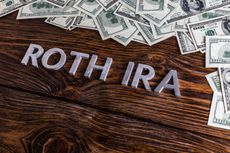Minimizing Taxes When You Inherit Money
Some inherited assets are tax-friendly, but under new rules, others come with a hefty tax bill. We help you get the most out of a legacy.


Unless you spend your winters in Aspen and your summers in the Hamptons, you probably don’t have to worry about paying federal estate taxes on an inheritance. In 2021, the federal estate tax doesn’t kick in unless an estate exceeds $11.7 million. The Biden administration has proposed lowering the exemption, but even that proposal wouldn’t affect estates valued at less than about $6 million. (Some states have lower thresholds, however.)
But if you inherit an IRA from a parent, taxes on mandatory withdrawals could leave you with a smaller legacy than you expected. And as IRAs become an increasingly significant retirement savings tool—Americans held more than $13 trillion in IRAs in the second quarter of 2021—there’s a good chance you’ll inherit at least one account.
How the SECURE Act Changed Things
Before 2020, beneficiaries of inherited IRAs (or other tax-deferred accounts, such as 401(k) plans) could transfer the money into an account known as an inherited (or “stretch”) IRA and take withdrawals over their life expectancy. This enabled them to minimize withdrawals, which are taxed at ordinary income tax rates, and allow the untapped funds to grow.

Sign up for Kiplinger’s Free E-Newsletters
Profit and prosper with the best of expert advice on investing, taxes, retirement, personal finance and more - straight to your e-mail.
Profit and prosper with the best of expert advice - straight to your e-mail.
The Setting Every Community Up for Retirement Enhancement (SECURE) Act of 2019 put an end to that tax-saving strategy. Now, most adult children and other non-spouse heirs who inherit an IRA on or after January 1, 2020, have just two options: Take a lump sum or transfer the money to an inherited IRA that must be depleted within 10 years after the death of the original owner.
The 10-year rule doesn’t apply to surviving spouses. They can roll the money into their own IRA and allow the account to grow, tax-deferred, until they must take required minimum distributions, which start at age 72. (If the IRA is a Roth, they don’t have to take RMDs.) Alternatively, spouses can transfer the money into an inherited IRA and take distributions based on their life expectancy. The SECURE Act also created exceptions for non-spouse beneficiaries who are minors, disabled or chronically ill, or less than 10 years younger than the original IRA owner.
But IRA beneficiaries who aren’t eligible for these exceptions could end up with a hefty tax bill, especially if the 10-year withdrawal period coincides with years in which they have a lot of other taxable income.
The 10-year rule also applies to inherited Roth IRAs, but with an important difference. While you must still deplete the account in 10 years, the distributions are tax-free, as long as the Roth was funded at least five years before the original owner died. If you don’t need the money, waiting to take distributions until you’re required to empty the account will provide you with up to 10 years of tax-free growth, says Victor Schultz, president and chief fiduciary officer at Prairie Trust, a wealth management firm in Brookfield, Wis.
Don't Rush to Cash Out an Inherited IRA
Many heirs simply cash out their parents’ IRAs, but if you take a lump sum from a traditional IRA, you’ll owe taxes on the entire amount. Depending on the size of the account, that could kick you into a higher tax bracket.
Transferring the money to an inherited IRA will allow you to spread out the tax bill, albeit for a shorter period than the law previously allowed. Taking an annual distribution of one-tenth of the amount of the IRA, for example, would probably minimize the impact on your tax bill. But because the new rules don’t require annual distributions, you have some flexibility. If you’re planning to retire in a couple of years and expect your tax bracket to drop, for example, it may make sense to postpone taking withdrawals until you stop working, says Howard Hook, a certified financial planner with EKS Associates, in Princeton, N.J. Still another option is to wait until year 10 to withdraw the money, which would give you a decade of tax-deferred growth. On the downside, withdrawing all of the money at once could trigger a bracket-breaking tax bill.
If you choose to transfer the money to an inherited IRA, make sure the funds are rolled directly into your account. If you take the money as a check, the entire amount will be treated as a taxable distribution. And however you divide up your withdrawals, make sure you empty your account by December 31 of the 10th year following the year of the original IRA owner’s death to avoid a draconian penalty of 50% of the amount you should have withdrawn.
How the Step-Up Basis Helps
Happily, most other inherited assets are much less burdensome, at least as far as the IRS is concerned. In fact, you could owe little or no tax on real estate, bank accounts and investments that aren’t held in tax-deferred accounts. That’s because the cost basis for these assets is “stepped up” to their value on the day of the original owner’s death.
Say your father paid $50 for a share of stock and it was worth $250 on the day he died; your basis would be $250. If you sell the stock immediately, you won’t owe any taxes, but if you hold on to it, you’ll only owe taxes (or be eligible to claim a loss) on the difference between $250 and the sale price. President Biden has proposed eliminating the step-up for gains of more than $1 million ($2 million for a married couple), but the outlook for that plan is unclear. Previous efforts to curb the step-up have been unsuccessful, in part because of the potential difficulties heirs would encounter in determining the basis for stocks and other assets that were purchased many years ago.
The step-up also applies to the value of your family home (and any other property you inherit), a big benefit at a time when many older homeowners have seen the value of their homes skyrocket.
If you decide to keep inherited investments or property, you will owe taxes on the difference between the value of the assets on the day of the original owner’s death and the day you sell. If an inherited stock or fund is appropriate for your long-term investment strategy, you may want to hold on to it, says Crystal Cox, a CFP with Wealthspire Advisors, in Madison, Wis. If not, you’re probably better off selling it and investing the proceeds in investments that suit your risk tolerance and portfolio allocation.
Figuring out what to do with an inherited home is more complicated. Unless you decide to keep the house—which may mean buying out other heirs—you’ll need to sell it, which could take months. In the interim, make sure to pay property taxes, insurance premiums and other costs associated with maintaining the home. This task typically falls to the executor. (See What to Do When You're the Executor for details.)
How to Lower Taxes for Your Heirs
If you own a traditional IRA (or other tax-deferred account), there are steps you can take to lessen the tax burden on your heirs.
Consider your beneficiaries. The SECURE Act’s 10-year rule for inherited IRAs has several exceptions. In addition to spouses, other heirs can still stretch out withdrawals over their lifetime, including minor children, beneficiaries who are ill or chronically disabled, and heirs who are less than 10 years younger than you. You may want to name those individuals as beneficiaries of your IRA and leave other types of assets to heirs who would be subject to the 10-year rule.
If that’s not an option, consider the financial status of your beneficiaries. You may want to bequeath your IRA to an adult child who is in a low tax bracket, for instance, and give other assets to a child who earns a six-figure income.
Convert some funds in your traditional IRA to a Roth. Although Roths are also subject to the 10-year rule, distributions aren’t taxed. That’s a huge bonus for your heirs, but you must pay taxes on any funds you convert.
Before converting any funds, compare your tax rate with those of your heirs. If your tax rate is much lower, converting some of your IRA funds to a Roth could make sense. The math is less compelling if your heirs’ tax rate is lower than yours, particularly if a conversion could kick you into a higher tax bracket.
Be aware, too, that a large Roth conversion could trigger higher Medicare premiums and taxes on your Social Security benefits.

To continue reading this article
please register for free
This is different from signing in to your print subscription
Why am I seeing this? Find out more here

Block joined Kiplinger in June 2012 from USA Today, where she was a reporter and personal finance columnist for more than 15 years. Prior to that, she worked for the Akron Beacon-Journal and Dow Jones Newswires. In 1993, she was a Knight-Bagehot fellow in economics and business journalism at the Columbia University Graduate School of Journalism. She has a BA in communications from Bethany College in Bethany, W.Va.
-
 Is a Phased Retirement Right for You?
Is a Phased Retirement Right for You?Want to keep working, just not as hard? A phased retirement may just be the answer.
By Kimberly Lankford Published
-
 Four Tips to Make Your Sales Presentation a Winner
Four Tips to Make Your Sales Presentation a WinnerBeing prepared and not being boring can go a long way toward persuading a potential customer to buy into what you’re offering.
By H. Dennis Beaver, Esq. Published
-
 403(b) Contribution Limits for 2024
403(b) Contribution Limits for 2024retirement plans Teachers and nonprofit workers can contribute more to a 403(b) retirement plan in 2024 than they could in 2023.
By Jackie Stewart Published
-
 SEP IRA Contribution Limits for 2024
SEP IRA Contribution Limits for 2024SEP IRA A good option for small business owners, SEP IRAs allow individual annual contributions of as much as $69,000 a year.
By Jackie Stewart Published
-
 Roth IRA Contribution Limits for 2024
Roth IRA Contribution Limits for 2024Roth IRAs Roth IRA contribution limits have gone up for 2024. Here's what you need to know.
By Jackie Stewart Published
-
 SIMPLE IRA Contribution Limits for 2024
SIMPLE IRA Contribution Limits for 2024simple IRA The maximum amount workers at small businesses can contribute to a SIMPLE IRA increased by $500 for 2024.
By Jackie Stewart Published
-
 457 Contribution Limits for 2024
457 Contribution Limits for 2024retirement plans State and local government workers can contribute more to their 457 plans in 2024 than in 2023.
By Jackie Stewart Published
-
 Roth 401(k) Contribution Limits for 2024
Roth 401(k) Contribution Limits for 2024retirement plans The Roth 401(k) contribution limit for 2024 is increasing, and workers who are 50 and older can save even more.
By Jackie Stewart Published
-
 7 Things Medicare Doesn’t Cover
7 Things Medicare Doesn’t CoverHealthy Living on a Budget Medicare Part A and Part B leave some pretty significant gaps in your health-care coverage. But Medicare Advantage has problems, too.
By Donna LeValley Last updated
-
 Best Foreclosure Sites for Finding Properties
Best Foreclosure Sites for Finding PropertiesMaking Your Money Last Wondering how to find foreclosed homes for sale for your next residence or to flip for a profit? These websites will guide you to foreclosures and real estate-owned properties to buy.
By Bob Niedt Last updated